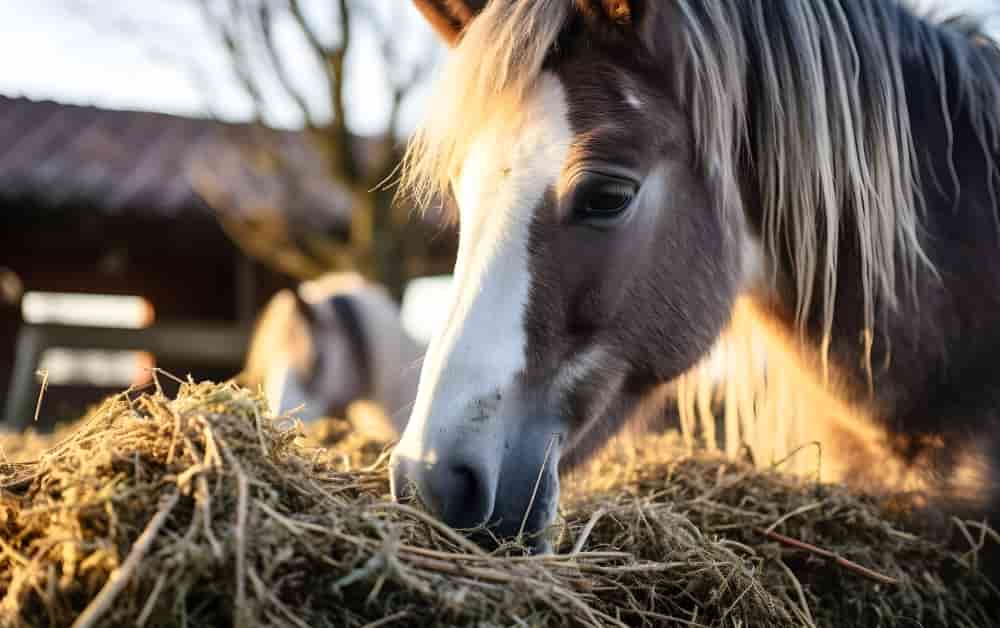Alfalfa vs. Timothy: Which Hay is Better for Your Livestock’s Diet?
When it comes to feeding livestock, choosing the right type of hay isn’t just about availability—it’s about nutrition, performance, and long-term health. Two of the most popular forage options are Alfalfa hay and Timothy hay, each with its own unique benefits and feeding applications. So how do you decide which one is best for your animals?
Whether you raise horses, goats, rabbits, or cattle, understanding the differences between these two types of hay can help you make smarter feeding decisions that support healthier, more productive livestock.

(Close up on horse eating hay.)
Alfalfa Hay: High in Protein, Ideal for Performance
Alfalfa is a legume hay, rich in nutrients and highly digestible. Often deep green in color, this hay is loaded with protein, calcium, and energy, making it ideal for:
- Growing animals
- Lactating or pregnant livestock
- Performance horses
- Goats and dairy cattle
Its higher protein content—typically between 15-20%—supports muscle development and energy needs, especially in young or active animals. Alfalfa also contains more calcium than grass hays, which can be beneficial for lactating does, ewes, or mares producing milk.
However, this richness can be too much for some animals, especially those that are easy keepers, sedentary, or prone to conditions like laminitis or urinary stones (such as wethers or gelded male goats). Overfeeding alfalfa may lead to excessive weight gain or metabolic issues if not balanced with the rest of their diet.
Timothy Hay: The Reliable Grass Hay
Timothy is a cool-season grass hay, known for its fiber-rich, lower-protein profile. It’s a favorite among horse owners and small animal enthusiasts due to its consistent quality and gentle nutritional makeup.
Typical nutrient content:
- Protein: 7–11%
- Calcium: Low to moderate
- Fiber: High
This hay is especially good for:
- Adult horses
- Miniature breeds
- Senior animals
- Rabbits and guinea pigs
- Livestock prone to weight gain or metabolic disorders
Because it’s lower in calories and calcium, Timothy is often used to maintain body condition without adding excess fat or energy. It promotes good digestive function thanks to its fiber content and is easier on the kidneys and liver compared to richer feeds.
Which Hay Should You Choose?
The best hay for your livestock ultimately depends on a few key factors:
1. Animal Type and Life Stage
- Young, lactating, or active animals benefit from Alfalfa’s richer nutrient profile.
- Mature, sedentary, or small animals thrive on Timothy’s balanced, fiber-rich formula.
2. Health Considerations
Timothy hay is usually the safer choice for animals with:
- Obesity
- Insulin resistance
- Bladder or kidney concerns
Alfalfa can be highly beneficial—but in moderation—for animals with high nutritional demands.
3. Feeding Strategy
Some owners blend both hays to balance energy and fiber. For example, mixing Alfalfa with Timothy can help provide adequate protein without going overboard on calories.
This approach also allows you to stretch your hay supply, especially if you’re feeding multiple species with different needs.
Final Thoughts: Quality Over Type
Regardless of which hay you choose, quality should always come first. Look for hay that is:
- Free from mold or dust
- Bright green in color
- Leafy with minimal stems
- Pleasant-smelling
At Ohana Farms, we specialize in both premium Alfalfa and clean, nutritious Timothy hay to meet the varying needs of livestock owners across the region. Whether you’re raising show goats or trail horses, we’re here to help you find the perfect feed solution—because healthy animals start with the right hay.

